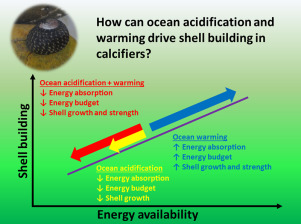当前位置:
X-MOL 学术
›
Sci. Total Environ.
›
论文详情
Our official English website, www.x-mol.net, welcomes your
feedback! (Note: you will need to create a separate account there.)
Linking energy budget to physiological adaptation: How a calcifying gastropod adjusts or succumbs to ocean acidification and warming.
Science of the Total Environment ( IF 8.2 ) Pub Date : 2020-01-25 , DOI: 10.1016/j.scitotenv.2020.136939 Jonathan Y S Leung 1 , Bayden D Russell 2 , Sean D Connell 3
Science of the Total Environment ( IF 8.2 ) Pub Date : 2020-01-25 , DOI: 10.1016/j.scitotenv.2020.136939 Jonathan Y S Leung 1 , Bayden D Russell 2 , Sean D Connell 3
Affiliation

|
Accelerating CO2 emissions have driven physico-chemical changes in the world's oceans, such as ocean acidification and warming. How marine organisms adjust or succumb to such environmental changes may be determined by their ability to balance energy intake against expenditure (i.e. energy budget) as energy supports physiological functions, including those with adaptive value. Here, we examined whether energy budget is a driver of physiological adaptability of marine calcifiers to the near-future ocean acidification and warming; i.e. how physiological energetics (respiration rate, feeding rate, energy assimilation and energy budget) relates to adjustments in shell growth and shell properties of a calcifying gastropod (Austrocochlea concamerata). We found that ocean warming boosted the energy budget of gastropods due to increased feeding rate, resulting in faster shell growth and greater shell strength (i.e. more mechanically resilient). When combined with ocean acidification, however, the gastropods had a substantial decrease in energy budget due to reduced feeding rate and energy assimilation, leading to the reduction in shell growth and shell strength. By linking energy budget to the adjustability of shell building, we revealed that energy availability can be critical to determine the physiological adaptability of marine calcifiers to the changing oceanic climate.
中文翻译:

将能量收支与生理适应性联系起来:钙化腹足动物如何适应或屈服于海洋酸化和变暖。
二氧化碳排放量的增加推动了世界海洋的物理化学变化,例如海洋酸化和变暖。当能量支持生理功能(包括具有适应性价值的功能)时,海洋生物如何平衡能量摄入与支出(即能量预算)的能力就可以决定海洋生物如何适应或屈服于此类环境变化。在这里,我们研究了能量预算是否是海洋钙化石对近期海洋酸化和变暖的生理适应性的驱动因素;即生理性能量(呼吸速率,进食速率,能量吸收和能量预算)如何与钙化腹足动物(Austrocochlea concamerata)的壳生长和壳特性的调节有关。我们发现,由于摄食速率增加,海洋变暖增加了腹足动物的能量收支,导致更快的外壳生长和更高的外壳强度(即更具机械弹性)。但是,当与海洋酸化结合使用时,腹足动物的能量收支会由于进给速度的降低和能量同化的降低而大大减少,从而导致壳的生长和壳强度的降低。通过将能源预算与贝壳建筑的可调节性联系起来,我们发现,能源可用性对于确定海洋钙化石对不断变化的海洋气候的生理适应性至关重要。
更新日期:2020-01-26
中文翻译:

将能量收支与生理适应性联系起来:钙化腹足动物如何适应或屈服于海洋酸化和变暖。
二氧化碳排放量的增加推动了世界海洋的物理化学变化,例如海洋酸化和变暖。当能量支持生理功能(包括具有适应性价值的功能)时,海洋生物如何平衡能量摄入与支出(即能量预算)的能力就可以决定海洋生物如何适应或屈服于此类环境变化。在这里,我们研究了能量预算是否是海洋钙化石对近期海洋酸化和变暖的生理适应性的驱动因素;即生理性能量(呼吸速率,进食速率,能量吸收和能量预算)如何与钙化腹足动物(Austrocochlea concamerata)的壳生长和壳特性的调节有关。我们发现,由于摄食速率增加,海洋变暖增加了腹足动物的能量收支,导致更快的外壳生长和更高的外壳强度(即更具机械弹性)。但是,当与海洋酸化结合使用时,腹足动物的能量收支会由于进给速度的降低和能量同化的降低而大大减少,从而导致壳的生长和壳强度的降低。通过将能源预算与贝壳建筑的可调节性联系起来,我们发现,能源可用性对于确定海洋钙化石对不断变化的海洋气候的生理适应性至关重要。










































 京公网安备 11010802027423号
京公网安备 11010802027423号